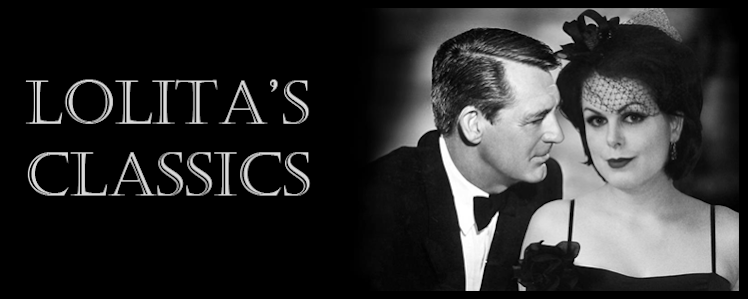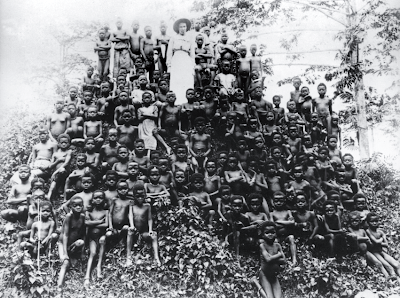Safari filmmakers Martin and Osa Johnson, 1920's.
Hey, I have a blog. Cool. And hey, I have not been kidnapped and/or murdered. I have just been devoured alive by 100 year old missionaries, wanting me to praise them for their pure soul and compassion with the uncivilized darkies in the deep jungles of Africa.
Missionary with Congolese children, early 1900's. No hegemony at all.
Well, at least that was the subject in school the last few weeks, and interesting as it was I have been absent from the blog, the social network, my mother, my husband and my life in general. So sue me. At least I have gathered some cool pictures that wouldn't fit in my power point presentation at school, so enjoy the power of the white man!
Hey, can't gather enough rubber for our car factories? "Off with their hands!"
This subject has something to do with the film industry, of course. As white men colonized the African continent in the 19th century, the pure hearted missionaries around the world heard about these wild, unenlightened people of the filthy jungles, and felt a need to Christen them.
Since most missionaries thought that the world is soon to end, they were flabbergasted by the amount of people not ever having heard of the Holy Bible. Saints as they were, they left their families and children at home and sent out to cure people of their otherness.
Rwanda, probably 1920's.
"Interesting thing that natives from other countries can show their breasts and genitals all they want in photographs and in films, but we normal people just get censored. I bet it's because animals have no concept of moral". - A quote I just made up
Now, of course the people at home had to know what good deeds the missionaries were doing in Otherland in order to raise money for the missions (Swedish missionaries were often in Congo, for example), they sent home photographs showing the process. The Swedish missionaries even co-operated with the ethnographic museum in Stockholm, sending confiscated wooden gods (
"the Negro can worship almost anything", as someone said) to the museum. In return, the indigenous people got some mass-produced western items. Mass-baptism, Bible studies and the burning of traditional relics were just another thing to do between tea breaks.
Before makover: Look at all those weird masks!
And weapons everywhere, bloodthirsty beasts!
Martin and Osa Johnsson, 1920's.
Ta-daa! They can almost look like normal people. At least when dressed in proper clothes and lined up in pretty rows. And with the essential presence of their European masters, signaling that they are not dangerous savages anymore.
Congo, early 1900's.
And then came the film medium! How effective a way to record the strangeness of the wild people it was. Now the entertainment industry caught up with
how cool it was to go to Africa and abuse natives. Of course, people had gone to Africa to kidnap interesting looking natives for a long time. They were exhibited alive (see
Hottentot Venus) at World's Fairs (quite common into the 1940's, actually), and
whole native villages were re-constructed for the civilized West to point sticks at.
The white man conquering the wild nature!
"Oh, I actually needed some elephant tusks for my new piano. Extraordinary."
Theodore Roosevelt somewhere in Africa, ca 1909.
Now the film medium would make it even easier for people to become fascinated by the weirdness of strange cultures. Often the films were accompanied by a story teller, or even an entertainer dressed in the indigenous culture's clothes, and entertainment was far more important than accurate information. See the following Pathé Frères picture
Roosevelt in Africa (1910). At about 3:02 you see the intertitle "Zulu women at spring". Nothing weird about that, except that Roosevelt was nowhere near South Africa at the time and that the women in the video are probably Masai. But hey, most people have heard about the wild Zulu's, it sells better. After the "Zulu women", there is a lovely little native rain dance. Not at all constructed.
Well, the Americans had their part in these kind of actions, too. (As though you didn't know.) While Europeans colonized Africa, Americans did their best to either kill or civilize the Native Americans. Native American schools were founded in the 1870's. A quote by the adorable founder of them, Herny Pratt, goes as follows:
"If the Native Americans had been better at English, it would have been easier for them to protect their interests." I'm paraphrasing, since the quote I found was translated to Swedish, but the idiocy of the quote is the same. You know, if those damn Congolese beasts had been better at Swedish/German/English/French/other-civilized-languages, they would have been able to defend their countries! That's poetic justice, for ya!
German missionaries in Tanzania, ca. 1905.
"It's your fault you didn't have any dictionaries in this country. And we had a flag."
But at least the film medium was used to protect the indigenous cultures from dying out entirely. (Yes,
that's exactly what people claimed back then. "Okay, it's probably not that nice to extinguish their cultural identity, but at least we record their strange rituals for their grand-grand-grandchildren to watch!")
Below I have an example from Edison Studios, called the "Buffalo Dance" (1894). Filmed in the legendary Black Maria Studio! Very realistic and worthy, indeed. With a stationary camera, they have to dance around in such small circles that they collide. But to finish this post off, you can see the results of the Native American School below the video. Ah, aren't we white people just saints?
After going to Native American School:
We let the woman keep her pipe. We'll just steal it later for museum exhibition.
(Red Dog, Lizzie Glode och Lucy Day, 1878-1918)











